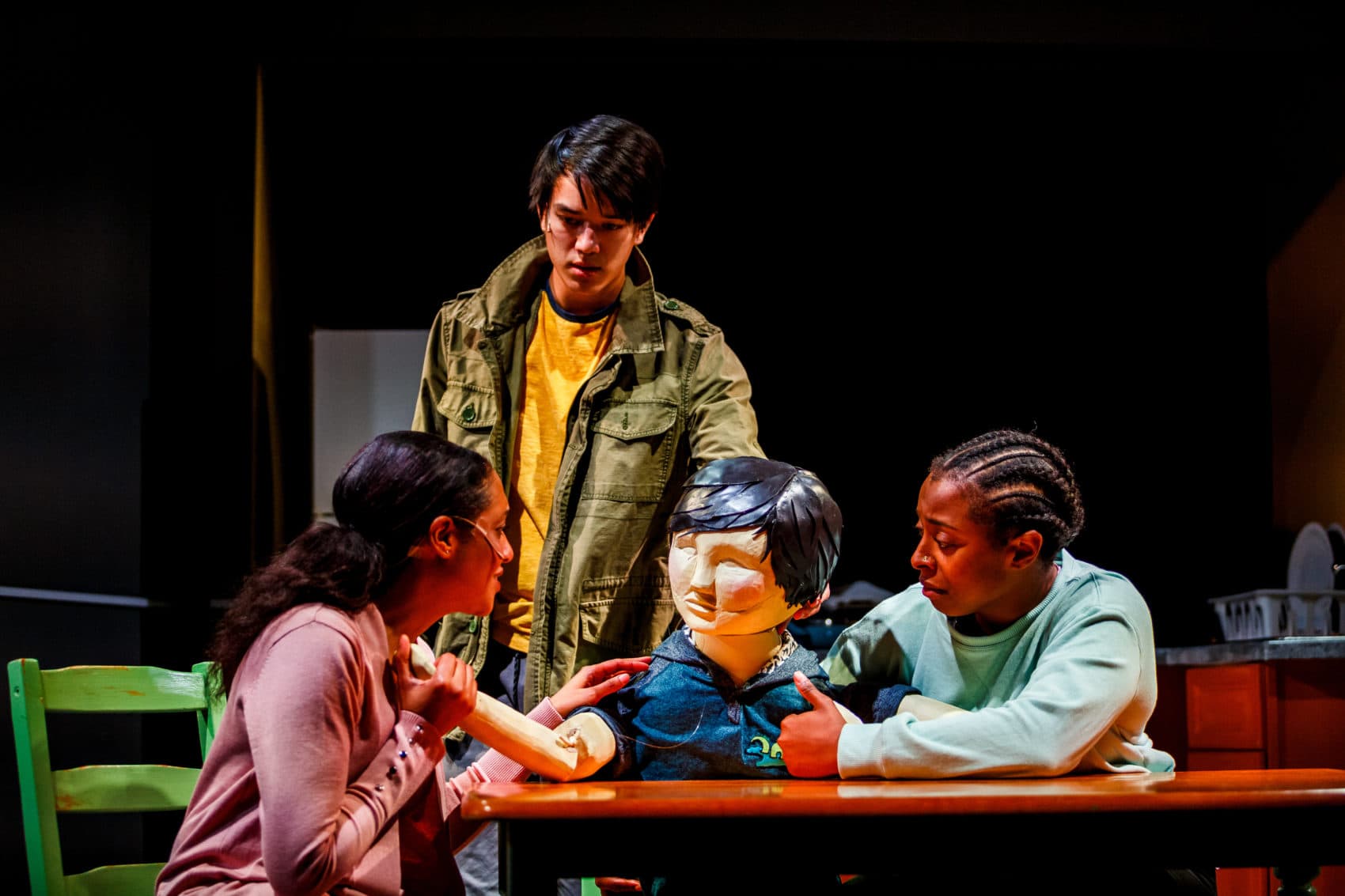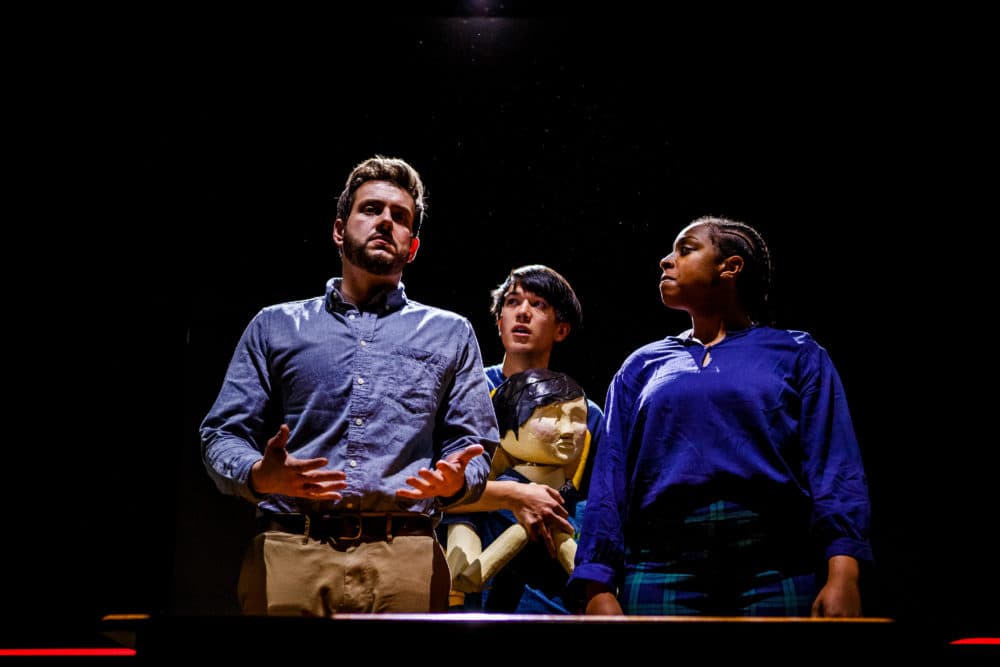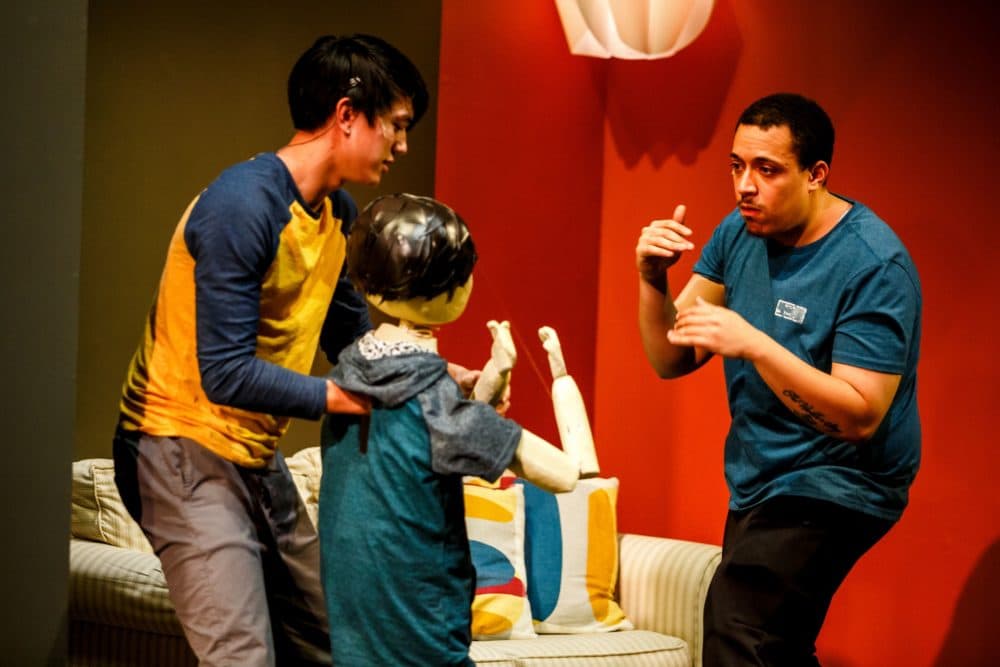Advertisement
Review
Company One's 'Wolf Play' Explores What It Means To Have A Pack

The protagonist of “Wolf Play” thinks he’s a wolf — though he’s really only a pup, portrayed by an adult actor manipulating a human-child puppet. This is knotty business but surprisingly affecting. South Korean playwright Hansol Jung’s new play, seen here in a National New Play Network rolling world premiere (by Company One Theatre at the Boston Public Library through Feb. 29) is both moving and metaphorically adroit. But in terms of traffic, it’s like navigating Grand Central Station without a clear destination.
In a way that’s apt because, given where the traumatized child at the center of “Wolf Play” has been, there may be no perfect place for him to land. A South Korean youngster, he was adopted (presumably legally) by a white American couple who live in Arizona. But as the play begins, he is being “re-homed,” by a parent who has advertised the child on the internet, with a family in San Francisco — that is until the original American dad learns that the new adopting couple are lesbians, one of whom is not entirely on board with the familial add-on.
Is it any wonder then that the boy has disassociated to embrace an identity other than human? Or that the persona he has wrapped himself around is lupine? Wolves, revered in some Eastern cultures, villainized in Western fairy tales, are known to adhere to an extreme pack mentality. And this little guy, whose birth name is Jeenu, has known no such thing. He is a “lone wolf” — one who, as the stresses ratchet up, observes of himself: “The wolf knows that he is alone, that all he has is his paws and his cunning to survive in the ever-changing environment.”

Kicking off the play with an image-ridden address to the audience, the human actor who manipulates the puppet and supplies its voice explains: “The truth is a wobbly thing, we shall wobble through our own set of truths like Jell-O on a freight train, and tonight I add a bump to that journey and put to you my truth. I am not what you think you see. I am the wolf.” And then he lets out a full-throttle howl.
But among the many complications of the play, the doubling of adult actor and child puppet is one that absolutely works — much as it does in Paula Vogel’s “The Long Christmas Ride Home,” in which three sad children are similarly represented by Bunraku puppets. This is partly because there is nothing cutesy about the puppet designed and built by Amanda Gibson and directed by Roxanna Myhrum, or in actor Minh-Anh Day’s bright voicing of him. Playwright Jung is specifically addressing transcultural adoption, and there is an Asian cast to the puppet’s face. But mostly the countenance hovers between mournful and blank — an expression that, as the play’s adult characters project their assumptions onto him, proves haunting.
Among those doing the projecting are the original adoptive dad (a deceptively amiable Greg Maraio) and the family being either enhanced or invaded, depending on whom you ask. Robin (a quietly intense Inés de la Cruz) is the half of the same-sex couple who desperately wants a child and who, as a lesbian, might find it harder to adopt through the legal system. Ash (a convincing Tonasia Jones), her wife, is a boxer who, despite her original hostility toward adopting, is the adult with whom Jeenu most strongly connects. After all, as he points out, wolves are “fighters.”
Then there is Robin’s ever-on-the-scene brother, Ryan (a bullish Adrian Peguero), who is Ash’s trainer and looking to her to put his boxing club on the map. To this crude mama’s boy, Jeenu is both an obstacle and a burgeoning male who needs toughening up. These characters all have conflicting agendas, none of which, at least at first, speaks to Wolf’s need for someone to be “the single most important breath in my space.”

Jung (whose Uganda-set “Cardboard Piano” was produced by New Repertory Theatre last year) has said she was first moved to write “Wolf Play” when she learned of the shady, inherently harmful internet business of re-homing. Also supplying inspiration was a Korean saying that translates, “Naturally, the arm folds inward.” According to the dramatist, that’s another way of saying “Back the pack” — hence the lupine analogy.
But whereas the play centers on the ways in which, increasingly in the modern world, we make our own families, it touches on so many other themes — among them the fight for equality for the LGBTQ community, the fight against masculine and clannish obtuseness, the fight of women to elbow their way into the male-dominated world of sports, the flaws of the legal system — that the play can feel cluttered. It is also, with its multiple, overlapping locations spread across the Rabb Auditorium boards, a challenge to stage.
Director Summer L. Williams finds ways to ameliorate the awkwardness, and at a climactic point, she effectively employs shadow puppetry to augment the artful use of Bunraku. Moreover, fight choreographer Jessica Scout Malone makes relatively harrowing a one-woman boxing match! Still, this is an imaginative rather than a naturalistic play, and the winnowing down of thematic jumble and kitchen-sink presentation would help cut to its poetic, emotional core.
But honing is what these National New Play Network rolling world premieres — in which several theaters present a new work over the course of a year — are about. (“Wolf Play” originated at Portland, Oregon’s Artists Repertory Theatre and was then presented by Chicago’s Gift Theatre.) “Wolf Play” also represents the second partnering of Company One with the BPL, whose sponsorship makes it possible for every performance to be open to the public on a pay-what-you-want (no minimum) basis. That’s a good thing — and if wolves had publicists, they would probably say the same of the play’s slant on a diminishing species better known for its dangerousness than for its fierce loyalty. But most importantly, however crowded “Wolf Play” gets, its central image is crystalline — and wrenching.
Company One Theatre’s production of “Wolf Play” continues at the Boston Public Library through Feb. 29.
